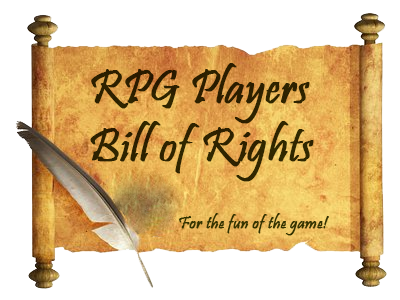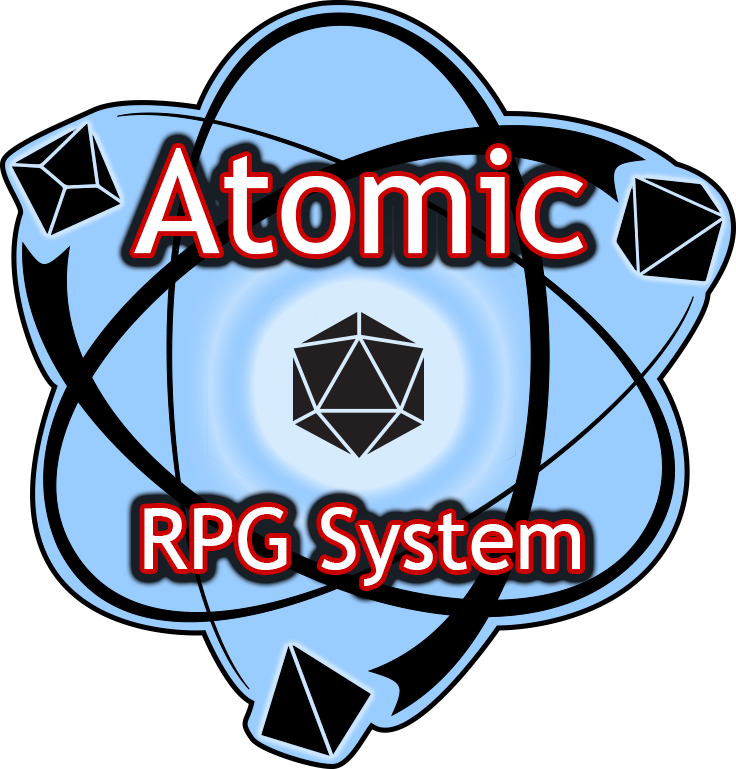 An RPG Player Bill of Rights is a great way to lay the foundation of how all players are treated. This applies to people outside of the game sessions as well as those players that are in the game session. There are some RPG Player Bill of Rights that are more self-evident than others but all should be observed during playing an RPG session.
An RPG Player Bill of Rights is a great way to lay the foundation of how all players are treated. This applies to people outside of the game sessions as well as those players that are in the game session. There are some RPG Player Bill of Rights that are more self-evident than others but all should be observed during playing an RPG session.
“Players” generally refers to both the people playing and running the game. “Game Master” refers to the person (or persons) running the game.
RPG Player Bill of Rights
1. Free Speech
RPG Player Bill of Rights grants players have the right to speak freely. Players have the right to petition other players and the Game Master in a courteous, respectful, and non-threatening manner. Players and Game Masters should not abridge the right of members to speak. Characters, on the other hand, are a different story, especially when it is not their turn!
2. Right to Bear Dice
Players should come to the game with all of the needed materials to play. Dice, books, calculators, paper, snacks, drinks, and anything the player will need during game time.
3. Quartering Tired Players
GMs should consider allowing players to spend the night at their house, or fellow players should offer intoxicated or tired players a ride if they are unable to safely return home on their own. Friends don’t let exhausted drunk dragon slayers drive home. The Game Master should end gameplay at a reasonable time to allow players to drive home safely and not impede upon the next day’s schedule. Guests should respect the GM’s kindness and guests should expect a safe place to sleep. Don’t mess with passed-out people.
4. Right to Privacy
RPG Player Bill of Rights grants players the right to keep some character information to themselves as long as these things are reasonable and can be revealed at climatically appropriate times.
Players also have a right to expect their persons and their personal possessions to be respected.
5. Probable Cause Against Cheating
Proof of cheating and misplay can and will be brought out into the open. Cheating harms the game and diminishes the experience.
6. Right to Speedy and Fair Rulings
RPG Player Bill of Rights expects players and GMs to make speedy arguments regarding rules and game mechanics. In the efforts of speeding up the game these discussions should take no more than 5 minutes. The GM ruling at the end of the 5 minutes is final.
Once the game ends a more lengthy investigation can be permitted if necessary. Rules and gameplay can be modified for the future should a different conclusion be agreed upon.
7. Excessive Costs Should Not Burden
When group-wide food or drink is provided, players may offer to pitch in for the cost or by providing food and/or drink the next game. If your group eats together as a group, a rotating schedule works well. Each player can bring a different thing to the table each game. Some people may not be able to participate in this arrangement. Be respectful of individual situations.
8. No Meta Player Retaliation
The actions of a player and their characters should never cross. Should one player feel they have been wronged by another player, the players and their character’s actions will not become mixed. Players should deal with players. Characters should deal with characters. Excessive penalties should never be given to either the players or the characters for meta reasons. Likewise, a character who initiates a flirtatious conversation with another character should not be misinterpreted as the player’s intent toward the other player. It’s a role-playing game, and should be treated as such.
9. Rights Will Not Infringe On Other Rights
None of the player rights in the RPG Player Bill of Rights should ever be used to deny other rights within the RPG Player Bill of Rights.
10. New Rules and Guidelines Democratically Decided
Any new rules or guidelines for the RPG Bill of Rights should be voted on. These changes to the RPG Bill of Rights should be democratically decided by vote of all of the players. A majority must be reached to be enacted.
11. Game Masters Have Final Ruling at The Table
Game Masters have the final say in rules, thoughts, or ideas when they are not addressed in the RPG Player Bill of Rights. They are the final arbiters if agreement cannot be made.
12. Vote In New Players
Any new player that joins an RPG group can play for a set number of games (our group uses two). After the end of the last trial game, the existing members can vote to add the new player or not. This is a great way to set the expectation of testing to see if a new player fits the group. If the new player is voted in, they become a permanent player with full voting privileges.
This can also be used to vote out a player should something change and a player become a problem to the group. If after other avenues of helping them have been exhausted, the existing permanent players may vote to remove a member of the group.
13. Respect All Players
RPG Player Bill of Rights requires all players at the gaming table to be treated with respect and dignity. All players should be treated equally. Also, do not confuse a player with the character they play.
14. RPG Group Formation
All players present at the formation of the RPG group are considered permanent players with all the rights and privileges inherent within.
15. Right to Vote
All permanent players have the right to vote on all calls to vote within the group. If important decisions need a vote the group will make absentee voting available.
16. The GM Can Impose Food Tax
If the GM provides food and or drink they have the ability to levy a fair tax on the players. Players should know ahead of time if there will be a charge for consuming the GM’s food and beverages.
17. Permanent Player
Permanent players are individuals in the RPG group that have been either voted in or created the gaming group. These players have a spot at the table and the ability to vote on group issues. They can also propose new rules for the RPG Player Bill of Rights, guidelines for the game, and toppings for the pizza.
18. Banning of Substances
The Game Master and the Host of the game have the right to ban consumption of illicit or intoxicating substances should they deem it necessary. Also, see 21 of the RPG Player Bill of Rights.
19. Cannot Deny Voting Rights
The right of permanent players in the gaming group to vote shall not be denied or abridged by anyone due to silly reasons.
20. Tenure of Game Master
The Game Master is welcome to run games as long as they are willing to run games. If someone else wants to run a game or campaign, the group should discuss. Running a game gives players a good understanding of the GM’s job and may make that person a better player when it’s time to play again. And Game Masters like to play sometimes, too!
21. Party Time
The Game Master or the Host may see fit to lift the ban on illicit or intoxicating substances. Cheers!
22. Player Tenure
Players who come in and out of a group will need to be voted in each time they come back, and if they are chronic bailers, they may be denied re-entry to the group. It is important for a player to be reliable, for the sake of the other players and the Game Master.
23. Guest Players
Permanent players have the ability to invite guest players to the table on occasion, with the permission of the GM and the group. Guest players are expected to understand and follow the RPG Player Bill of Rights.
24. Guest Player to Permanent Player
If a guest player wants to play more than 50% of all of the RPG games, they should go through the permanent player process.
25. Backup Game Mastering
In case the regular Game Master is unable to run a game, long time permanent players can run “side quests”. Secondary Game Masters may want to keep some basic side plots in mind in the rare case that the GM comes down with a sickness. This way the RPG game can go on!
26. Game Age Expectations
A GM should advise the group regarding the campaign’s basic rating of G, PG, PG-13, R, or NC-17. All members must meet the age requirement, and gameplay must stay within the boundaries of the game’s rating. If players become uncomfortable with an aspect of the game, they should address their concern with the Game Master.
27. Rules of Compensation
Rules can be established in the group to compensate the Game Master for their efforts.
Players can also be voted on to be compensated if they always host the game or provide food or other services.
Summary of the RPG Player Bill of Rights
This is a great list of rights and rules to follow. These should be applied to everyone equally in the RPG group. The RPG Player Bill of Rights will help to establish decorum in your RPG group as well as present a precedent to judge future actions. This RPG Player Bill of Rights can also be a good tool to use during group arguments and disputes. As silly as it may seem on the surface, adopting something like this RPG Player Bill of Rights for your group can really help.
Here is another article if you are interested in further expanding your own RPG Player Bill of Rights. Please post below any ideas or thoughts you have regarding a RPG Player Bill of Rights. I am quite interested in other groups’ guidelines!

2 Responses
Sanitation: No trash left behind. Take out your take out. Don’t leave your trash for others to pick up. It’s rude, unsanitary and can get you voted off the table.
That’s a good one. Clean up after yourself. It really does help.